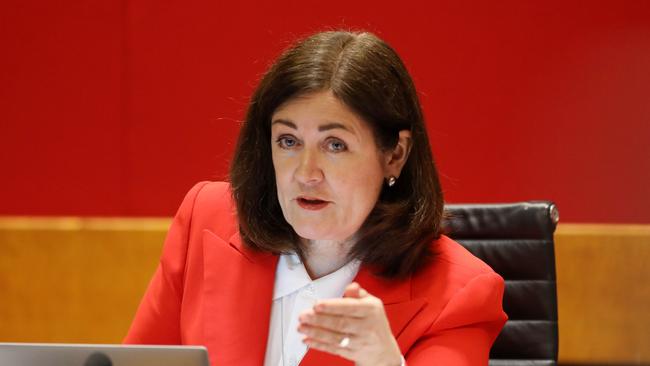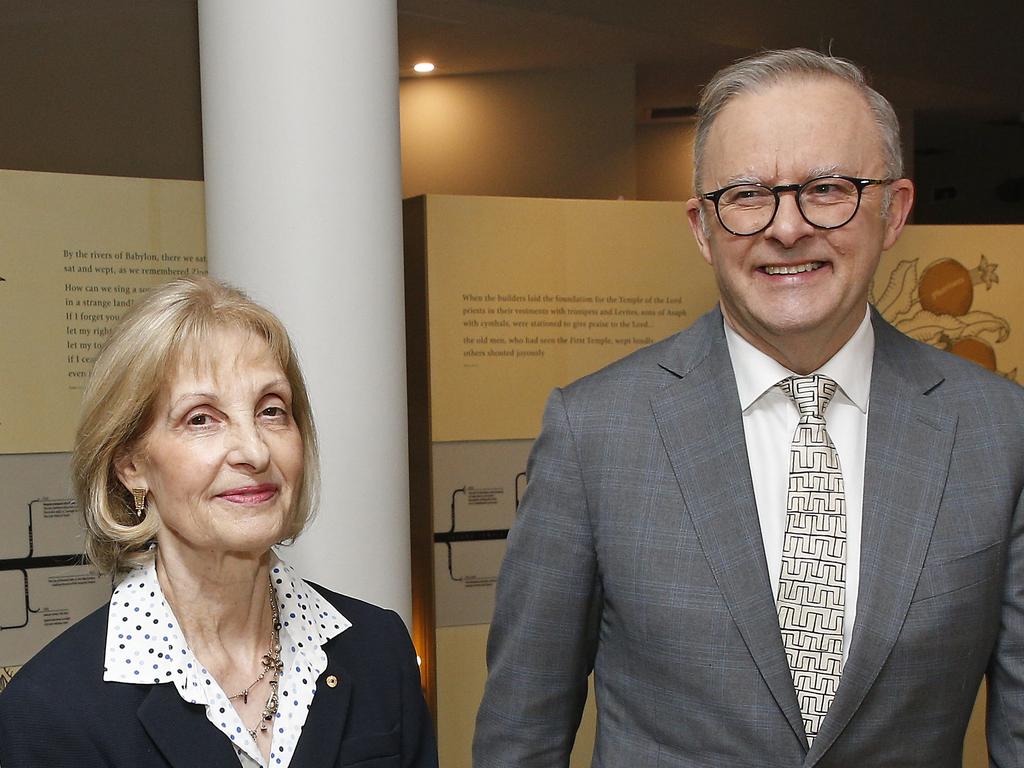AHRC open to campus anti-Semitism judicial inquiry ahead of university leaders fronting Senate
The Australian Human Rights Commission says a judicial inquiry into campus anti-Semitism is one way to address the ‘increase in anti-Semitism on university campuses’.

The Australian Human Rights Commission says a judicial inquiry into campus anti-Semitism is one way to address the “increase in anti-Semitism on university campuses”.
The organisation, which has recently come under heavy criticism and has been accused of going “AWOL” on anti-Semitism, was months ago commissioned by the federal government to conduct a study of racism at universities.
That study will investigate “anti-Semitism, Islamophobia, anti-Palestinian and anti-Arab racism … as well as the racism experienced by First Nations students and staff”.
The AHRC said a Coalition-proposed judicial inquiry into campus anti-Semitism would be “one way to (address the increase in anti-Semitism on campuses) and should be considered within a broader framework of measures designed to address anti-Semitism, and racism more broadly”.
The organisation’s submission to the Senate committee into a bill to establish a judicial inquiry said it would “welcome the opportunity to work collegiately with (a judicial inquiry) in addressing anti-Semitism in Australia”.
That Senate committee on Friday will hold hearings where the witnesses scheduled to appear include vice-chancellors of universities that hosted pro-Palestine encampment protests, the AHRC, and the university regulator, among others.
The Albanese government’s hand-picked special envoy to combat anti-Semitism recently blasted the AHRC and the government-commissioned review, saying Jewish staff and students have “no confidence currently in … the AHRC to approach their evidence with impartiality and appropriate respect” and this called “into question the ultimate efficacy of the government’s referral to the AHRC to study racism at universities”.
Opposition education spokeswoman Sarah Henderson, who introduced the judicial inquiry bill under scrutiny by the Senate committee, on Thursday set out priorities for her questioning at the Friday hearing.
“In particular, University of Sydney vice-chancellor Mark Scott must explain why members of extremist group Hizb ut-Tahrir were allowed to remain on campus and menace Jewish students with vile protests and terrorist slogans,” she said.
This comes as the University of Sydney and NSW Police appear to have different accounts of their interactions with each other in relation to Hizb ut-Tahrir’s involvement in the pro-Palestine encampment on campus.
Professor Scott recently told NSW budget estimates that he received a call in May that the extremist group may have a presence on campus that this was referred to the university security team which is “in constant contact with police”.
He also said he had a meeting with NSW Police after a Channel 9 report in June about Hizb ut-Tahrir’s connection with the encampment protest and said he was assured he would be notified of any relevant information about the encampment in relation to “extremist, violent, and radicalised behaviour”.
However, NSW Police told parliament in July no element of the University of Sydney notified the police of activity of Hizb ut-Tahrir on campus. Furthermore, it said it had “no information to indicate” that Professor Scott was aware of Hizb ut-Tahrir’s activity at the encampment.
When contacted for comment, both organisations stood by their accounts.
Senator Henderson also said she would be “seeking a full explanation from ANU vice-chancellor Genevieve Bell over reversing the expulsion of a student who supports terrorist group Hamas”.
“I am disgusted this student is now back on campus and running to be ANU student president which poses a direct threat to Jewish students. This is a shocking reflection on the university’s commitment to student safety.”
The Australian on Wednesday revealed that ANU pro-Palestine encampment leader Beatrice Tucker, who was expelled after saying on radio that Hamas “deserved unconditional support”, recently had her expulsion reversed and is now a candidate for the top job at the ANU student association.
Separately, Liberal senator Dave Sharma wrote a letter to the ANU on Thursday demanding an explanation as to why the university reversed Tucker’s expulsion.
Peak Jewish community organisations are also expected to front the Friday hearing.
The Zionist Federation of Australia said no other minority group would be expected to put up with the sheer scale of hatred at universities, referring to a list of almost 50 serious incidents of “violence, hostility and anti-Semitism incidents” on campus since March 2024.
This included testimony from a visibly Jewish male student at Melbourne University being yelled at and photographed by members of the pro-Palestine encampment, Monash University being required to respond to a social media post stating “Zionists are not welcome” on campus, and Jewish students at Sydney University reporting they were too afraid to attend class amid protests.
President of the ZFA Jeremy Leibler said “these dozens of violent, hostile, and antisemitic incidents that have been allowed to flourish on our university campuses this year should unnerve and alarm every single Australian. Enough is enough; this is exactly why a Judicial Inquiry must happen - the situation on our campuses is untenable.
“No other minority would be expected to put up with the level of vitriol, violence, and pure hatred on campus; Jewish students and academics are asking that the same protections that are afforded to other minorities are equally afforded to them.”
“While some universities have demonstrated leadership, the complete dearth of leadership at others has created an environment where students have been given the greenlight to do or say whatever they want with zero consequences, including having students openly support a proscribed terrorist organisation.”






To join the conversation, please log in. Don't have an account? Register
Join the conversation, you are commenting as Logout